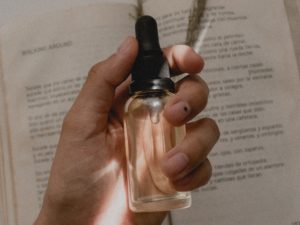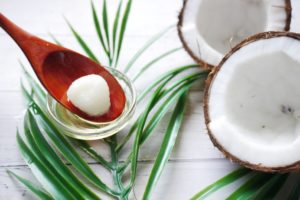Argan Oil – A Complete Guide to This Amazing Oil
With so many facial oils to choose from, it can be hard to make a decision. This guide to argan oil can help you out a bit.

Keep reading to find out everything you need to know about argan oil, including its benefits, how to use it, and what skin types can benefit from it. Plus, get tips on how to get the most out of your facial oil in your current skincare routine.
What are Facial Oils
Facial oils are a skincare ingredient that is extracted from various plants or seeds. By extracting the oils from these sources, we can obtain products that are safe for the skin and even have many benefits. There are many different types of facial oils such as rose hip, jojoba, almond, coconut, and argan oil. Each oil has different properties, and benefits, and can help address different skin concerns. These oils are usually high in beneficial antioxidants and vitamins, making them the perfect addition to a skincare routine. Best of all, different oils are suitable for different skin types, so finding a facial oil for you is a matter of knowing the different properties of each and making a decision that best suits your skin concerns.
Official oils can be used in their pure form, or oils can be found in different skin care products such as moisturizers or serums. The oil of this article, argan oil, can be found in many products due to its plentiful benefits, hydrating effects, and protection against environmental stressors. If you intend to use facial oil in its purest form, make sure it is cold-pressed. Cold press means the process of extracting the oil was mechanical at low temperatures. High temperatures tend to denature and spoil plants and seeds. Plus, chemical forms of extracting oil can also be irritating or hazardous to the skin, so always look for cold-pressed oils for the face.
What is Argan Oil
Argan oil is an oil that is derived from the kernels of the Arden tree, which is native to Morocco. This oil is high in fatty acids and can be commonly found in cooking products, skin care products, and cosmetic products. It can be taken orally, or applied to the skin, hair, and nails. There are many benefits to this oil, no matter which method you choose to use it in. This guide will mostly focus on its benefits as a facial oil applied topically, though the benefits of its consumption will be touched on.
Benefits
Facial oils in general are not a necessary step of a simple skin care routine. However, many people find them beneficial as facial oils tend to be very moisturizing. They can help keep hydration in the skin and allow your skincare ingredients to work more efficiently. Facial oils can also offer a lot of protection, particularly argan oil.
Argan oil is very hydrating due to its composition of vitamins and fatty acids. It contains vitamin E, squalene, saturated and unsaturated fatty acids, and coenzyme q10. The vitamins and antioxidants in this oil make it very beneficial in protecting against environmental toxins, pollutants, and damage. Its vitamin E offers moisture and nourishment for the skin and can even help reduce irritation and inflammation. It contains many compounds that support this anti-inflammatory effect, making it ideal for treatment.
If taken orally, argan oil is rich in oleic acid, which is very beneficial in reducing the risk of heart disease. It may even have benefits for people with diabetes or insulin resistance.
What Skin Type Should Use It?
Many skin types can benefit from using argan oil. It is particularly beneficial for individuals with very dry skin due to its composition high in fatty acids and hydration. People who have allergic reactions to oleic and linoleic acids, however, should take note of how the skin reacts to this facial oil. Argan oil is high in these fatty acids and individuals sensitive to these may experience irritation. It’s also important to note that if you have sensitive skin, this oil May cause a reaction.
In essence, if you’re looking for a facial oil for dry skin, argan is perfect for you, as is coconut oil, though coconut oil is not recommended for acne-prone skin. Dry skin can also benefit from jojoba oil, as this oil is very similar to the natural sebum produced by our own skin. If you have oily skin, rosehip may be the perfect option as this oil can help balance the sebum and reduce the production of excess.
How to Use
Argan oil can be applied as a final step in your skincare routine, right before applying SPF. It can layer very well over moisturizers, serums, or any other skincare product. This oil is highly beneficial in a morning routine as its composition can help protect your skin from environmental damage you may experience throughout the day.
If you are using it for your hair, it can be effectively applied directly onto your scalp or hair strands. It can even be usefully taken orally, improving the moisture level of the skin. If you are interested in argan oil as a supplement, it is beneficial to eat about 25 to 30 ml per day. However, if you’re interested in skin improvement, it can be applied topically to any areas that need a bit of support and hydration.
Quick Tips for Oils
Here are some general tips for using skin care oils in your current routine. Make sure you follow these tips for a seamless incorporation of facial oils into your skincare routine.
- Combine with moisturizer – if you find facial oils to be a bit too wet and heavy, it may be beneficial to mix your facial oil with your current moisturizer. This will boost the properties of your moisturizer and not leave you feeling greasy.
- Patch test – some individuals with certain skin conditions or allergies may have a reaction to argan oil, or any other facial oil. When you are incorporating a new skincare ingredient into your routine, it’s important to patch test first. Apply a bit to the leg or arm and wait 48 hours to see if you have an adverse reaction. If you don’t, apply it to your face and wait as well.
- Add it slowly – allow your skin time to get used to the use of a new skincare ingredient. If you’re using facial oil, try to start slowly. Use it two times a week, and then boost the use as needed. This will give your skin time to adjust to the new product.
The Takeaway
Argan oil is a very beneficial facial oil that can be a lifesaver for individuals with dry skin. Its composition of nourishment, vitamins, and antioxidants makes it a powerhouse in terms of benefits. Try it out in your skincare routine if you’re interested in extra hydration, support, and defense.
Remember that health comes from within. Eat nutritious food, exercise when you can, and take care of your mental health. Daily habits become the building blocks for emotional, mental, and physical health. Take care of your gut health too! Learn everything you need to know about gut microbiota today for free here.





